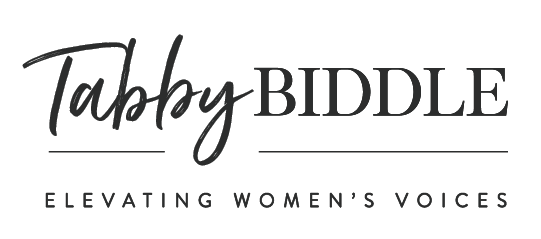5 Steps to Move Through Writer's Block
by Tabby Biddle
The dreaded writer’s block. I know it well.
As an author, essayist, blogger and public speaker over the last 15 years, and as a writing coach for women changemakers and leaders working with them on their books, blogs, essays, articles, TEDx talks and other public speaking scripts over the last decade, I am intimately familiar with writer’s block.
The blank page. The overwhelm. The terror. It can be a painful place to be.
In my experience, writer’s block typically comes from fear. A fear of speaking about something you’ve never spoken about before; a fear of others becoming angry about what you have to say; a fear of others judging you, disagreeing with you, and challenging you; a fear of becoming isolated or humiliated because of what you wrote; or a fear that your life might become endangered if you write and speak your truth.
I completely understand this.
As women, it can feel scary for us stake a claim for our ideas, opinions, stories, and visions because we know that many women have been persecuted for these things — in this lifetime and for centuries and millennia before that. This all lives within us, within our collective consciousness.
If you are struggling with writer’s block, I encourage you to try the steps below to move through it. Your voice is too important to keep silent.
5 Steps to Move Through Writer’s Block
Have some compassion for yourself.
If you feel stuck in your writing, don’t make yourself wrong in any way. Be gentle and have compassion for yourself. Remember that there are a lot of reasons that women writers can feel fearful about putting their ideas down on paper. Acknowledging this is the first step to moving through writer’s block.
Ask yourself this question.
If you get to a section of your writing and you feel stuck, I encourage you to pull out a blank sheet of paper and do a 5-minute stream-of-consciousness writing, answering this question: What am I scared to talk about? Set your timer for 5 minutes and write. Let it pour out. No editing. This is for you only. If you want to rip it up afterwards, you can.
Name your fears.
Now ask yourself: What do I think will happen if I share this? Set your timer again for 5 minutes and write about this on a blank sheet of paper. Write down all of those dark thoughts and fears. These are likely what is blocking you. I know it can feel scary, but you need to get these out. Naming these things will give them less power over you.
Identify who you can help.
You are likely writing to help someone in some way — to educate them, to awaken them, to enlighten them, to heal them, to empower them, to help them see and feel that they are not alone. If you do not know who your writing can help, then please take a moment to get clear on this. Set your timer for 5 minutes and fill in this sentence: I know if I write about this, I could help… (and then name the people or the group(s) of people who you could help). Allow this to motivate you and be fuel for moving through your fears to write what you came here to say.
Get back to your writing!
Please don’t think you have failed in any way if you encounter writer’s block. You are not doomed to failure. The block means you are on the precipice of shifting out of an old fear or pattern that no longer serves you. So, I encourage you to keep showing up for your writing. This is how you’ll keep moving forward and make the change you are here to make in the world. There is an audience waiting for you.
When you are staking a claim for your ideas, opinions, stories or visions, whether in a book, an article, an essay, a blog, or a public talk, I understand this can feel daunting. As a female changemaker, you are likely not writing and speaking about something that is well-accepted or understood. You are paving a pathway for a new way of doing something, thinking about something, or a new way of being in the world.
Please honor yourself for the big work you are doing. As you use your voice to write and speak about what’s true for you, you are likely also speaking for other women who are silent. If you can help just one person feel less alone, writing what you have to say is worth it.
ABOUT TABBY
Tabby Biddle, M.S. Ed. is a women’s leadership coach, writer and consultant dedicated to uplifting and championing women’s voices. She is a two-time United Nations Foundation Press Fellow, bestselling author of Find Your Voice: A Woman’s Call to Action, and the facilitator of the Divine Feminine Writer’s Group and Women on Stage. Curious about working with Tabby?



